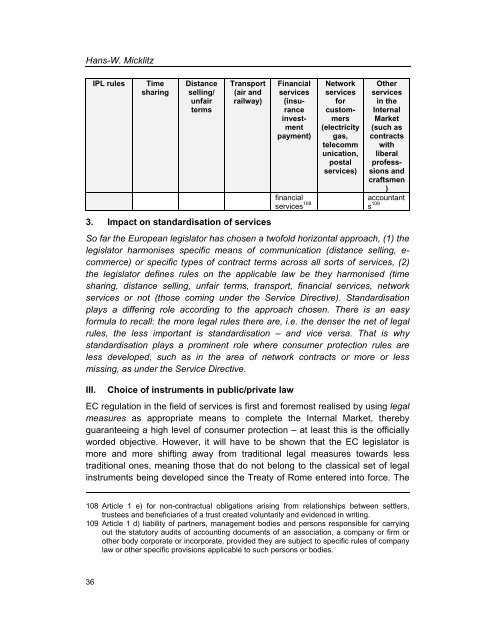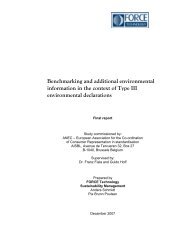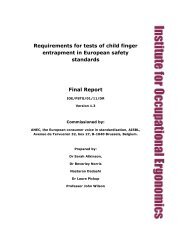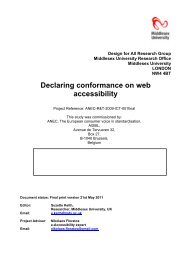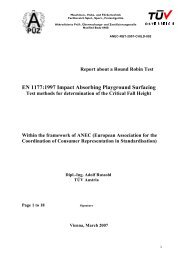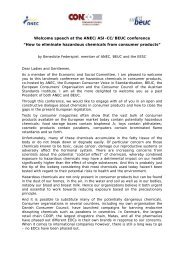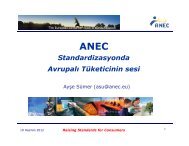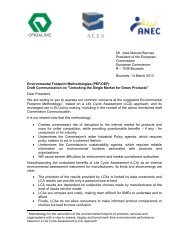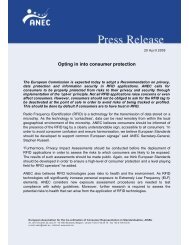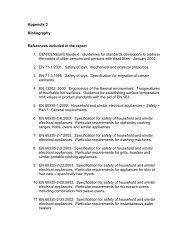Services Standards: Defining the Core Consumer Elements ... - ANEC
Services Standards: Defining the Core Consumer Elements ... - ANEC
Services Standards: Defining the Core Consumer Elements ... - ANEC
Create successful ePaper yourself
Turn your PDF publications into a flip-book with our unique Google optimized e-Paper software.
Hans-W. Micklitz<br />
IPL rules<br />
Time<br />
sharing<br />
Distance<br />
selling/<br />
unfair<br />
terms<br />
Transport<br />
(air and<br />
railway)<br />
3. Impact on standardisation of services<br />
Financial<br />
services<br />
(insurance<br />
investment<br />
payment)<br />
financial<br />
services 108<br />
Network<br />
services<br />
for<br />
custommers<br />
(electricity<br />
gas,<br />
telecomm<br />
unication,<br />
postal<br />
services)<br />
O<strong>the</strong>r<br />
services<br />
in <strong>the</strong><br />
Internal<br />
Market<br />
(such as<br />
contracts<br />
with<br />
liberal<br />
professsions<br />
and<br />
craftsmen<br />
)<br />
accountant<br />
s 109<br />
So far <strong>the</strong> European legislator has chosen a twofold horizontal approach, (1) <strong>the</strong><br />
legislator harmonises specific means of communication (distance selling, e-<br />
commerce) or specific types of contract terms across all sorts of services, (2)<br />
<strong>the</strong> legislator defines rules on <strong>the</strong> applicable law be <strong>the</strong>y harmonised (time<br />
sharing, distance selling, unfair terms, transport, financial services, network<br />
services or not (those coming under <strong>the</strong> Service Directive). Standardisation<br />
plays a differing role according to <strong>the</strong> approach chosen. There is an easy<br />
formula to recall: <strong>the</strong> more legal rules <strong>the</strong>re are, i.e. <strong>the</strong> denser <strong>the</strong> net of legal<br />
rules, <strong>the</strong> less important is standardisation – and vice versa. That is why<br />
standardisation plays a prominent role where consumer protection rules are<br />
less developed, such as in <strong>the</strong> area of network contracts or more or less<br />
missing, as under <strong>the</strong> Service Directive.<br />
III.<br />
Choice of instruments in public/private law<br />
EC regulation in <strong>the</strong> field of services is first and foremost realised by using legal<br />
measures as appropriate means to complete <strong>the</strong> Internal Market, <strong>the</strong>reby<br />
guaranteeing a high level of consumer protection – at least this is <strong>the</strong> officially<br />
worded objective. However, it will have to be shown that <strong>the</strong> EC legislator is<br />
more and more shifting away from traditional legal measures towards less<br />
traditional ones, meaning those that do not belong to <strong>the</strong> classical set of legal<br />
instruments being developed since <strong>the</strong> Treaty of Rome entered into force. The<br />
108 Article 1 e) for non-contractual obligations arising from relationships between settlers,<br />
trustees and beneficiaries of a trust created voluntarily and evidenced in writing.<br />
109 Article 1 d) liability of partners, management bodies and persons responsible for carrying<br />
out <strong>the</strong> statutory audits of accounting documents of an association, a company or firm or<br />
o<strong>the</strong>r body corporate or incorporate, provided <strong>the</strong>y are subject to specific rules of company<br />
law or o<strong>the</strong>r specific provisions applicable to such persons or bodies.<br />
36


